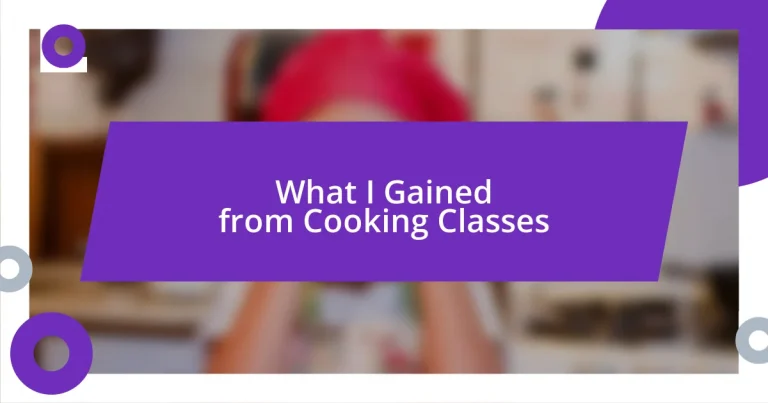Key takeaways:
- Cooking classes foster a sense of community and connections among participants, enhancing the overall experience.
- Mastering essential culinary techniques, such as knife skills and emulsification, boosts confidence and creativity in the kitchen.
- Cooking can lead to personal growth, resilience, and healthier eating habits, transforming both culinary skills and lifestyle choices.
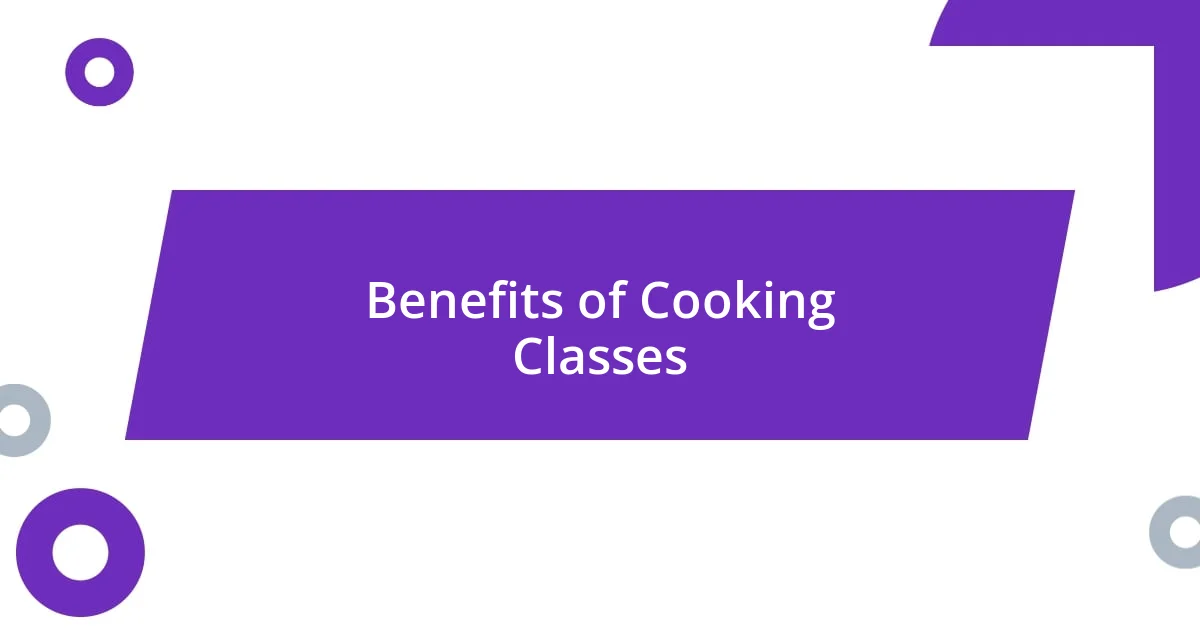
Benefits of Cooking Classes
One standout benefit of cooking classes is the sense of community they foster. I remember my first class; I was a bit nervous walking in, but almost instantly, everyone started chatting and laughing together while chopping vegetables. Isn’t it amazing how preparing food can bring people together and create bonds that last well beyond the class?
Another aspect that truly stood out to me was the boost in confidence I felt in the kitchen. Before these classes, I would stick to recipes I knew by heart, fearing failure. Now, I can experiment boldly with flavors and ingredients. Isn’t it empowering to know that you can tackle more complex dishes without that nagging doubt in the back of your mind?
Let’s not overlook the practical skills gained, either. I vividly recall the evening when we learned knife skills—what a game changer! I was amazed at the difference it made in my food prep times. Have you ever considered how mastering fundamental techniques can change your entire cooking experience? I certainly have, and it’s been an exhilarating journey of discovery for me.
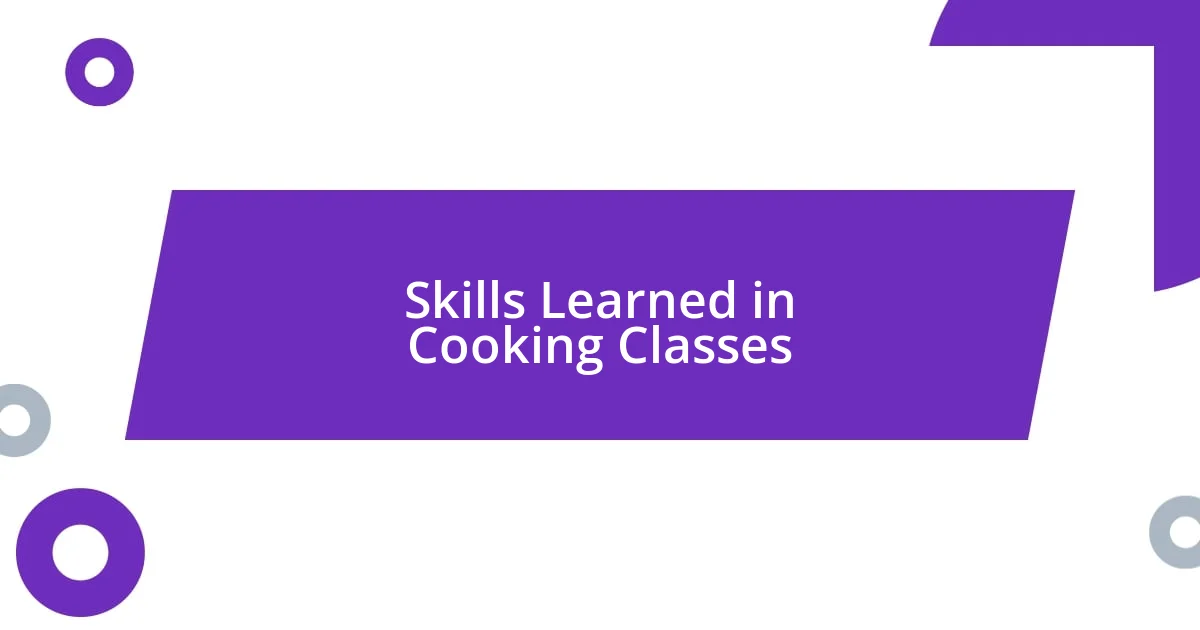
Skills Learned in Cooking Classes
When it comes to skills learned in cooking classes, I can’t emphasize enough the value of mastering the basics. For instance, I remember a workshop focused solely on the art of sautéing. The instructor broke down the process for us, and suddenly, I felt like I had unlocked a key to a new realm of flavors. I still apply those techniques today—transforming simple ingredients into delicious meals. The confidence that comes from knowing how to effectively use heat and timing is something I cherish.
- Knife skills that make food prep efficient.
- Understanding flavor profiles and how to balance them.
- Techniques such as roasting, sautéing, and braising.
- Safe food handling practices that boost hygiene.
- Ingredient substitutions that encourage flexibility.
Each of these skills allowed me to approach cooking with newfound creativity and assurance. It’s fascinating how these foundational techniques ripple out into every dish I prepare.
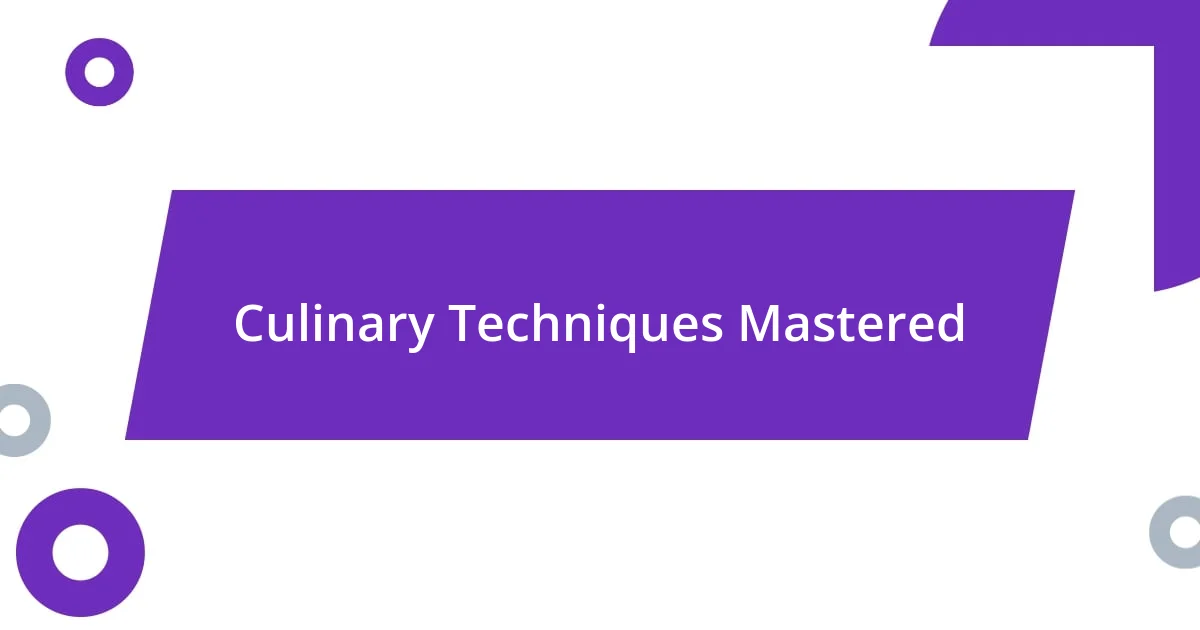
Culinary Techniques Mastered
Cooking classes have allowed me to dive deep into various culinary techniques that I now consider essential in my kitchen. For instance, I remember the moment I learned how to properly sear meat. The sound of that initial sizzle is something I can’t forget. It’s like music to my ears! The instructor emphasized the importance of resting the meat afterward, and I’ve applied that lesson to every roast I make since. Have you ever tasted a dish that had just the right amount of juiciness? That’s what truly mastering this technique has brought to my meals.
Another technique that I’ve come to love is emulsification, especially when making dressings. I vividly recall my surprise when whipped oil and vinegar transformed into a creamy vinaigrette right before my eyes. It was like magic! Now, I enjoy experimenting with different oils and acids, creating my own unique blends. The thrill of discovery is something every home chef should experience. It’s rewarding to take control of flavors and achieve that perfect balance.
Lastly, let’s talk about plating—an aspect I’ve learned is just as crucial as cooking. In one class, we spent an entire session simply arranging our dishes. I never realized that a sprinkle of fresh herbs or a drizzle of sauce could elevate a meal so dramatically. Now, every time I serve dinner, I take the time to present my food beautifully. Isn’t it amazing how presentation can enhance the overall dining experience?
| Culinary Technique | Personal Experience |
|---|---|
| Searing Meat | The sizzle of meat hitting a hot pan gives me a thrill. Resting allows for juiciness to shine! |
| Emulsification | Transforming oil and vinegar into a creamy dressing felt like culinary magic—so satisfying! |
| Plating | Eagerly arranging dishes with herbs has turned every meal into a special occasion. |
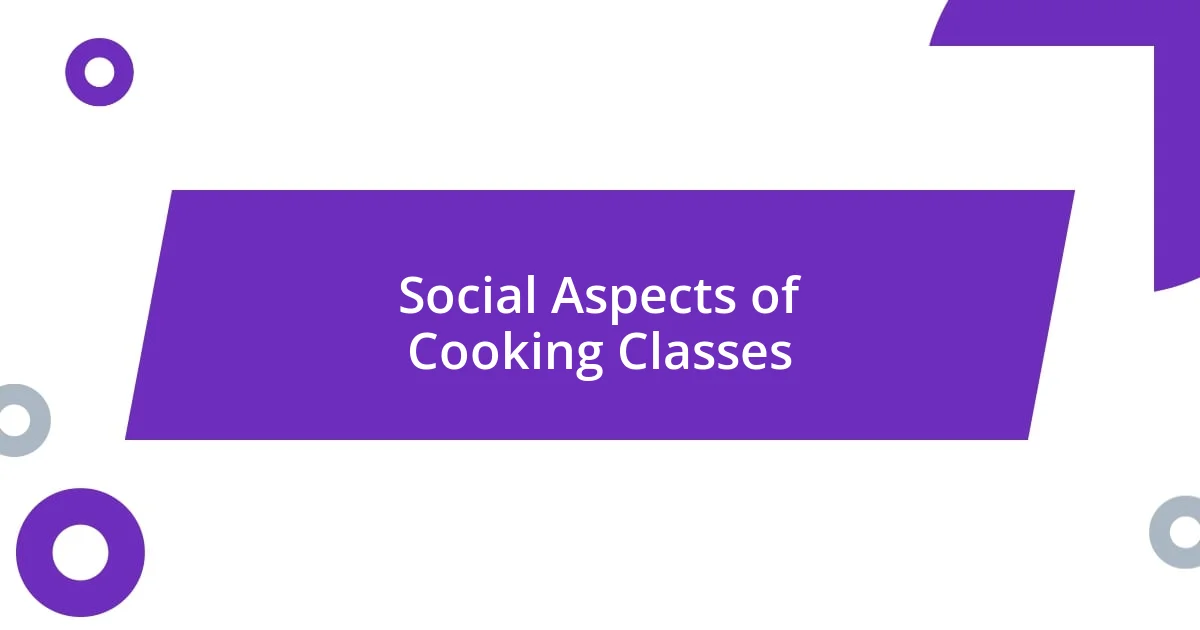
Social Aspects of Cooking Classes
Taking cooking classes introduces you to a vibrant community of fellow food enthusiasts. I still remember the first time I chopped veggies beside a stranger who quickly became a friend. We exchanged favorite recipes and cooking tips, which made the experience feel less like a class and more like a cozy gathering. Isn’t it fascinating how food has this incredible power to connect people, even those who start as complete strangers?
Through these classes, I’ve also participated in group challenges that enhanced our collaboration skills. In one memorable session, we were divided into teams to create a full course meal. The room buzzed with laughter and communication as we combined our strengths—some excelled at seasoning while others crafted stunning desserts. By the end of the night, we not only feasted on a delightful meal but also forged bonds over shared accomplishments. It was a reminder that cooking can be a collective journey, not just a solo endeavor.
Moreover, the social aspect extends beyond the classroom. Attending these cooking classes often led to future potluck invitations and dinner parties. I remember bringing a dish I learned during a lesson to a friend’s gathering, and the compliments I received sparked joy and pride. Isn’t it heartwarming to see how skills developed in a class can foster even more connections through shared meals and celebrations? Cooking truly becomes a way to express love and creativity within a community.
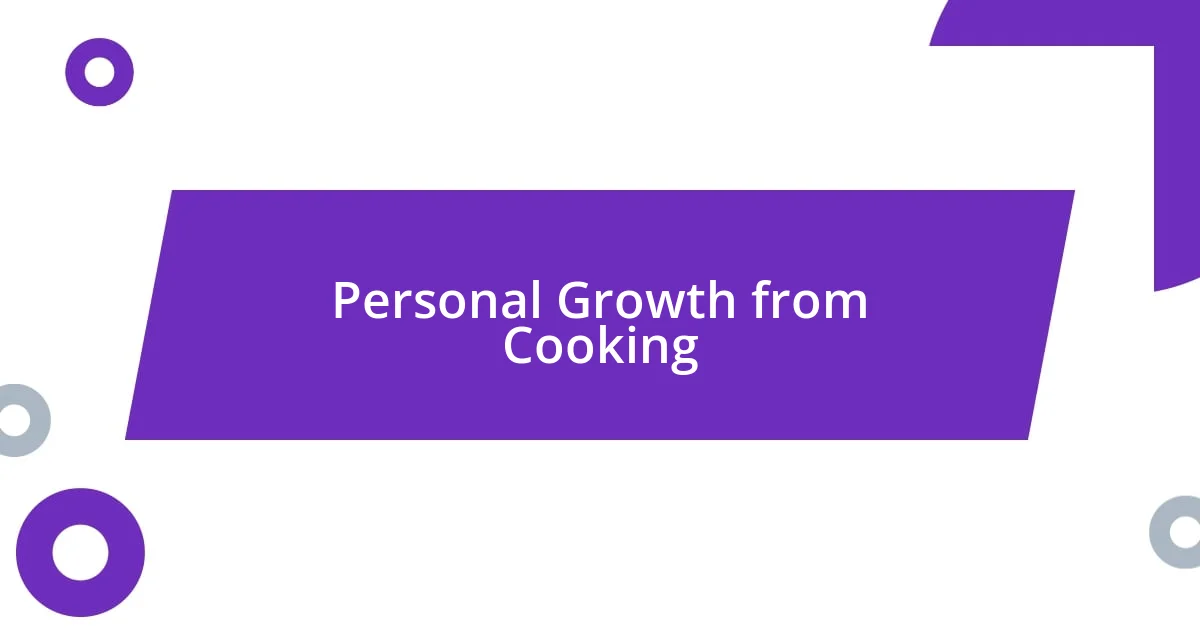
Personal Growth from Cooking
I never anticipated how cooking classes would spur my personal growth. The first time I sautéed vegetables, I was anxious about timing and heat control. As I stirred the pan, I felt a rush of empowerment from taking charge of my meal. It taught me that confidence can blossom from simply embracing the act of cooking. Have you ever stumbled upon a newfound skill that transformed your perspective?
Through these classes, I discovered resilience. One evening, I made my first soufflé, and, oh, did it flop! Instead of letting that setback discourage me, I found myself laughing it off and trying again. Each failure became a stepping stone to mastering the delicate art of baking. This process has instilled a sense of patience and persistence in me—traits that spill over into other areas of my life. How often do we allow small setbacks to teach us valuable lessons?
Moreover, cooking has nurtured a deep sense of gratitude in me. With every meal I prepare, I become more aware of the ingredients and the effort that goes into creating them. During a class, we talked about sourcing local produce, and I felt a new appreciation for farmers and their hard work that I previously took for granted. This insight sparked a joy in me—one that motivates me to cook mindfully and to share meals with loved ones, fostering connections around the table. Isn’t it enriching how personal growth can stem from something as simple as cooking?
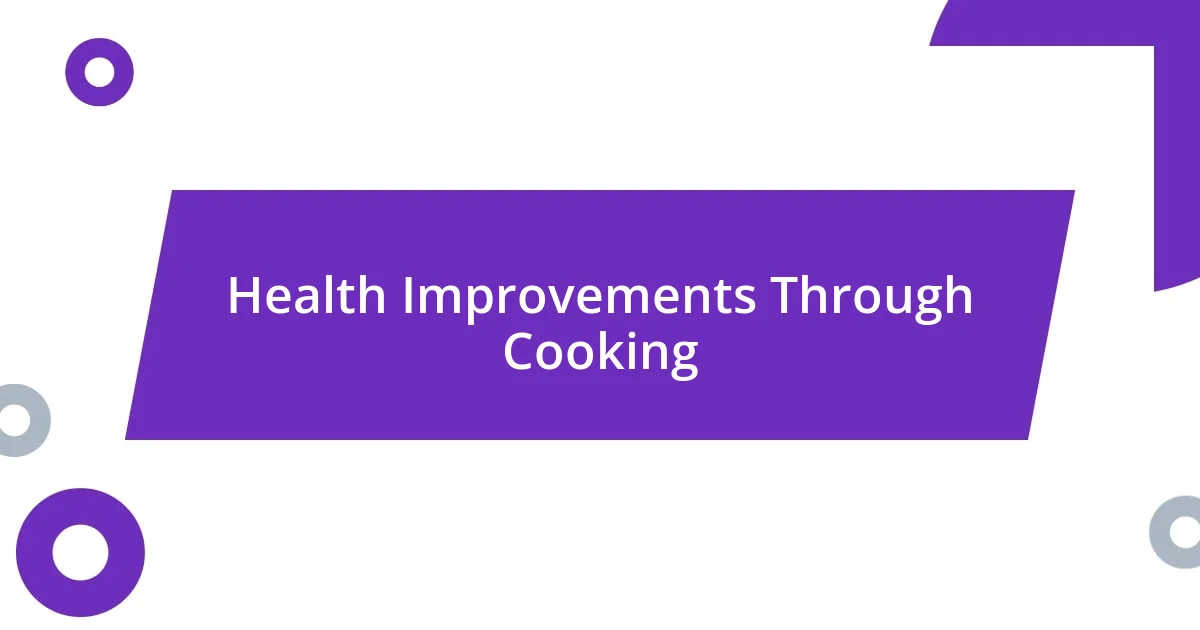
Health Improvements Through Cooking
Taking cooking classes can significantly enhance one’s health in ways that might not be immediately apparent. For instance, I used to rely on pre-packaged meals, thinking they were easier. But after learning the basics of meal prepping, I’ve noticed how cooking fresh ingredients boosts not just my physical health but also my mental well-being. The process is therapeutic; chopping and mixing becomes a mindful activity, allowing me to unwind from a busy day.
I’ve also become more aware of the nutritional value of what I consume. One class focused on cooking with whole foods, and I remember the instructor challenging us to create a dish without anything processed. This experience opened my eyes to the variety and richness of fresh produce. Now, when I shop, I gravitate towards vibrant vegetables and whole grains, not only because they taste better, but because I know they fuel my body. Have you ever tried a homemade dish that made you feel invincible?
Furthermore, I’ve found that cooking encourages healthier eating habits. In my journey, I’ve swapped out less healthy ingredients for more nutritious options, often inspired by techniques I learned in class. For example, replacing heavy creams with coconut milk in recipes has brought a lightness to my dishes, both in flavor and calorie count. It’s amazing how simple substitutions can make a significant impact on my overall health! Isn’t it gratifying to realize that the skills gained from cooking classes extend far beyond culinary techniques and delve into transformative lifestyle changes?
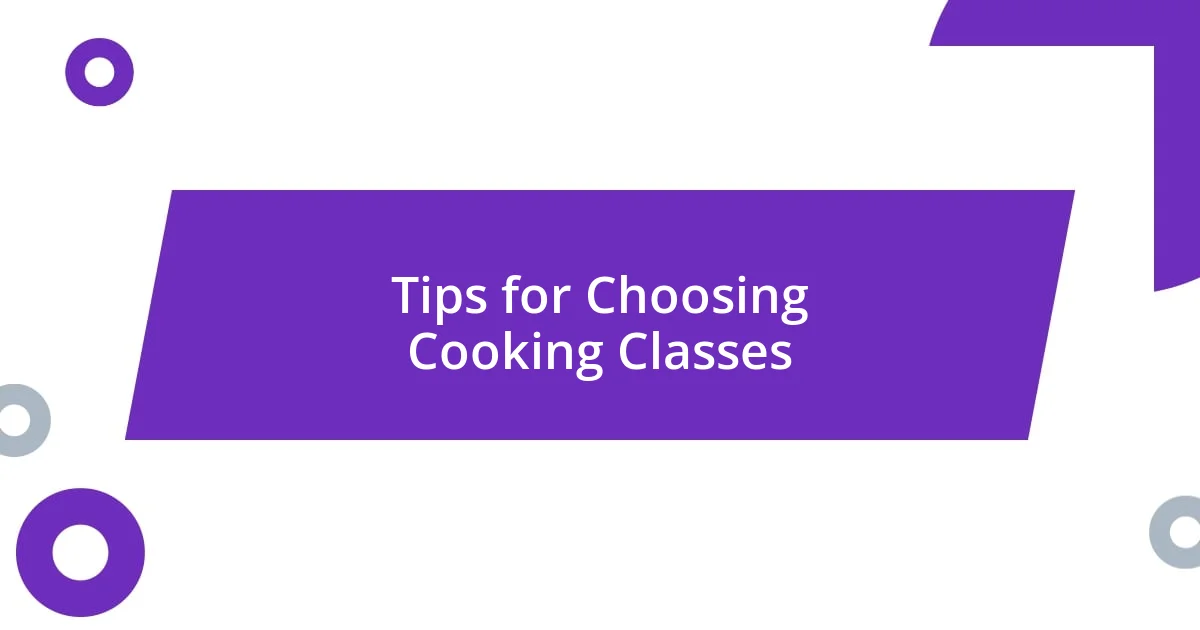
Tips for Choosing Cooking Classes
When searching for the right cooking class, consider your culinary goals first. Are you hoping to master basic skills, dive into international cuisines, or refine your baking techniques? Personally, I started with a local class that focused on Italian cooking, and it set a clear foundation for my culinary journey. Knowing what you want to achieve helps narrow down options and makes the experience far more fulfilling.
Next, explore the instructor’s background and teaching style. I vividly recall attending a class where the chef not only showcased his fantastic skills but also shared stories from his travels, which made learning feel personal and engaging. It transformed a simple class into a memorable experience, creating a connection that made me more invested in the lessons. What’s the value of knowledge if it doesn’t come with passion and personality?
Don’t overlook the class size and environment. Smaller classes often provide more hands-on guidance and opportunities to ask questions, which I found invaluable. In one class, the intimate setting allowed me to receive immediate feedback while trying my hand at knife skills, something I would have struggled with in a larger group. Have you ever felt lost in a crowd? A comfortable atmosphere can lead to greater learning and growth, so seek out a space where you feel supported and encouraged.












